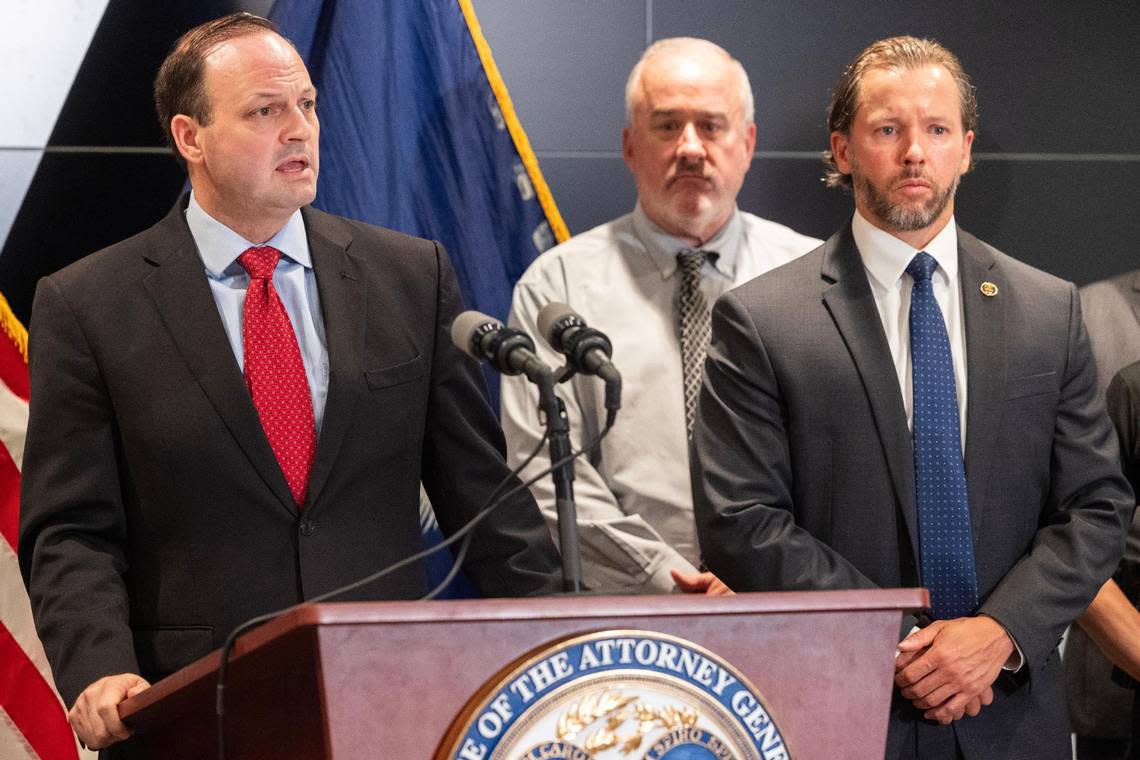64 arrested, one charged with murder in Upstate fentanyl trafficking sweep

More than 60 people have been arrested and charged with participating in a wide-reaching drug trafficking scheme in South Carolina’s Upstate, according to the state Attorney General’s office. The target of the multi-jurisdictional effort is fentanyl, which has driven surging deaths by overdose across the state.
Indictments unsealed Wednesday by the South Carolina Attorney General’s Office as part of an operation called “Devil in Disguise” charge 64 people across four counties. Fifty-nine of the defendants were charged with crimes related to the distribution and trafficking of fentanyl.
While the majority of the charges focus on narcotics trafficking and money laundering, three people have been charged with accessory and conspiracy to commit murder — one of them has been charged with murder — as prosecutors advance a new legal theory that says individuals who sell fentanyl that leads to a fatal overdose can be charged in the death.
It is the latest effort in what South Carolina Attorney General Alan Wilson has called “a war on drugs in the Upstate.”
“I have a message for those who seek to profit from this poison: We are coming for you and we’re going to use every weapon at our disposal,” Wilson said at a news conference Wednesday. “If you knowingly sell a drug that you know to be laced with fentanyl, and has the potential to kill somebody, and it actually does, we consider you a murderer.”
The trafficking and distribution operation, which Wilson linked to Mexican drug cartels, moved an estimated 500 kilograms of fentanyl since January 2020, Wilson said. Investigators seized a kilogram of the synthetic opiate, which Wilson said carried an estimated street value of $25,000 to $30,000. Among other drugs, 1.5 kilograms of methamphetimine, valued at $4,500, also were seized in the investigation.
Six fentanyl overdose deaths have been linked to the operation, with another eight under investigation, Wilson said.
One indictment charged three people — Dean Morris Wolvington Jr., Amanda Raye Massengale and Raphpel Manwel Suber — with the death of Emily Turner by allegedly providing her with fentanyl in Greenville County on March 20, 2022.
All three were charged with conspiracy to commit murder and accessory before the fact. Wolvington was also charged with murder for his alleged role in Turner‘s death.
It is only the second time that the South Carolina Attorney General’s Office has charged someone with murder for providing drugs that lead to an overdose death.
In March 2022, Shiv Balvant Tailor pleaded guilty to drug trafficking and manslaughter for his role in a scheme dealing counterfeit Roxycodone tablets, a prescription opioid often known by the nickname “Roxies.” The pills contained a mixture of heroin and other substances, including fentanyl, according the Attorney General’s Office.
Tailor initially was charged with murder when 19-year-old Bailey Brunson died after taking one of the counterfeit pills, sold by Tailor, that contained fentanyl.
“Our legal theory here is sound,” said Creighton Waters chief attorney of the grand jury division of the state Attorney General’s Office. “If you are knowingly dealing something or doing an activity that has a reasonable probability of causing death or serious bodily harm, that is the function of malice. And that is what you need for murder.”
Nationally, an effort is underway to make the sale of fentanyl that leads to an overdose death a federal murder charge. Republican U.S. Sen. Tim Scott of South Carolina has co-sponsored the bill, which was introduced last February by U.S. Sen. Marco Rubio, R-Florida.
In his remarks, Wilson thanked several agencies, including the South Carolina Law Enforcement Division, the 13th Circuit Solicitor’s Office, the U.S. Department of Homeland Security, the Greenville County Multi-Jurisdictional Drug Enforcement Unit, the S.C. National Guard Counterdrug Task Force as well as sheriff’s offices, police departments and coroners from across the Upstate.
The cases will be prosecuted by Assistant Attorney General Christina Allard, Assistant Attorney General Johnny James Jr., Waters, and 13th Circuit Assistant Solicitor E. Walker Miller.
Bond hearings for some of the defendants were held on Wednesday and Thursday in Greenville County.
The war on fentanyl
From 2020 to 2021, the state Department of Health and Environmental Control reports that overdose deaths increased from 1,734 to 2,168. The increase was driven in large part by a growing number of deaths caused by fentanyl.
By 2021, DHEC reported that deaths from fentanyl overdoses represented more than two-thirds of all opiate overdose deaths, for a total of 1,494 — a 35% increased from the previous year.
Just two milligrams of fentanyl can be fatal, according to the DEA. The agency reports that one kilogram of fentanyl has “the potential to kill 500,000 people.”
Part of the danger is that fentanyl is increasingly finding its way into other drugs, either through carelessness or from dealers looking to stretch their supply.
“Fentanyl is present in everything,” Waters said, explaining that it had been found in marijuana, cocaine and methamphetamine. “We don’t even really see Molly or Ecstacy anymore, it’s just meth and fentanyl.”
“Any illicit drug, particularly any counterfeit pill that you take, potentially is Russian roulette these days,” Waters said.
“It is everywhere. There’s fentanyl overdoses occurring in Greenville County, Pickens County, and Anderson County almost daily,” said 13th Circuit Solicitor W. Walter Wilkins. Fentanyl has largely entered into the Upstate in the last four years, Wilkins said.
In 2023, Greenville County recorded 166 overdose deaths, 137 of which were from fentanyl. This was a significant decline from 278 overdose deaths in 2022.
The trend was similar in Pickens County, which had 48 overdose deaths in 2022, 29 of which were from fentanyl. In 2023, Pickens County recorded 27 deaths, 19 of which were from Fentanyl.
“Anecdotally, we are seeing a drop in deaths thanks to this war on drugs that we are waging here in the Upstate,” Wilson said. “My hope is that we can prevent any more senseless deaths.”

